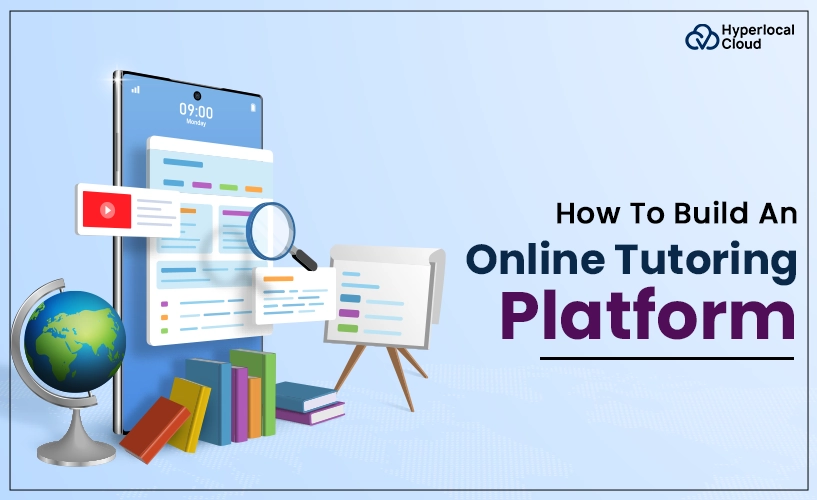How To Build An Online Tutoring Platform

Nothing sticks better to the mind than visuals. That is why online tutoring platforms have become a top choice for many to accomplish their study goals.
Crafting an immersive learning experience transcending physical boundaries becomes the new norm. The demand for accessible, flexible, personalized learning solutions has exponentially accelerated the growth of online tutoring platforms as fruitful alternatives to traditional classroom settings.
The global online tutoring service market can expand at a compound annual growth rate (CAGR) of 14.9% by 2030.
Online tutoring app development stands out as the most exciting way to kick off the journey of eLearning businesses. However, developing an online tutoring platform requires a meticulous blend of innovative technology, user-centric design, and pedagogical expertise.
In this blog, we will delve into the developmental phase of online tutoring platforms, enlightening you on their various features and the benefits they bring.
Online Tutoring Platform: An Emphatic Understanding
It is a digital environment that connects students with tutors for educational support and learning. Online tutoring platforms leverage Internet technology’s power and enable real-time interaction between tutors and students, regardless of their physical locations. They typically offer various subjects and topics, catering to different educational levels, from elementary school to college.
An online tutoring platform is a digital setting that makes education equally impeccable and functional, connecting students with tutors for educational support and learning.
Statista describes online learning platforms as digital portals that provide various educational courses and resources. These platforms facilitate learning in different formats, such as interactive sessions, video lectures, and assessments.
A responsive teaching platform is the foundation of a satisfying educational platform, ensuring students attend sessions interestingly, regardless of their device.
Unlocking Online Tutoring Growth: Why Is It Gaining Popularity?
Umpteen factors are persuading the online tutoring market toward significant growth and popularity. Explore why it is happening-
Flexibility: It helps students attend online classes, and teachers take sessions without scheduling conflicts or geographical limitations.
Global Reach: Online tutoring platforms connect pupils with experts in different subjects or specialized areas that may be available elsewhere.
Technological Advancements: Virtual whiteboards, screen sharing, video conferencing, and real-time messaging facilitate engagement during tutoring sessions.
Personalized Learning: With algorithms and data analytics, online tutoring platforms assess students’ learning needs and preferences.
Cost-efficiency: Online portals eradicate travel costs for tutors and students, including overhead expenses associated with maintaining physical tutoring centers.
Ready to transform your online course platforms with tech-driven strategies
Four Leading Names of Online Tutoring Platforms
At the heart of education lies sharing knowledge everywhere, which is the foundation of successful online tutoring platforms. Followed imperatively by top platforms that deliver content as per users’ requirements, explore four of them that have won the competitive land.
1. Chegg Tutors:
Known for its diverse subjects and reasonable pricing, Chegg Tutors makes it accessible to a broad spectrum of students looking for reliable academic support.
Features:
24X7 Availability: Offers round-the-clock access to tutors helping students in their respective courses.
Interactive Whiteboard: Using this whiteboard, students collaborate with teachers to solve problems and doubts digitally.
Flexible Scheduling: Provides flexibility in scheduling sessions to acclimate students’ schedules.
2. Tutor.com:
Prominent for its exhaustive tutoring services, the platform covers different subjects and grade levels.
Features:
Instant Access: Offers on-demand tutoring and instant access to students for immediate online sessions.
Personalized Sessions: Provides customized sessions tailored to individual student needs and learning styles.
Skill Development Resources: Proffers additional resources like educational videos and quiz content for skill development.
3. Varsity Tutors:
Renowned for flexibility, Varsity Tutors allows students to choose tutors and sessions suitable for their schedules and learning goals.
Features:
Live Learning Platform: Supports interactive sessions with tutors employing virtual whiteboards and video conferencing.
Expert Match: Enhance matching proficiency based on students’ and tutors’ specific needs and preferences.
Wide Subject Coverage: Offers tutoring in different subjects, test preparation (SAT, ACT, etc.), and enrichment programs.
4. Wyzant:
Wyzant stands out for its user-friendly platform and diverse tutor pool. It is also a hub of professionals and educators across various fields.
Features:
Personalized Matching: Connects students with tutors per their specific requirements, ensuring customized learning experiences.
In-Person and Online Options: Offers online and in-person tutoring options, catering to distinct preferences.
Transparent Pricing: Allows students and tutors to negotiate rates and schedules directly.
Discover the Benefits of Online Tutoring Platform Development
As we gaze into the crystal ball of eLearning app development, one thing becomes increasingly clear: the rising demand for online education and tutoring is reshaping the education industry. With more people connecting with their online tutors, it’s time to leverage the execution of online tutoring platform development with the benefits mentioned below.
For Business Owners
Growth Potential: One significant advantage of an online tutoring platform is its scalability or growth potential. An online platform serves students across diverse time zones. The capability to scale operations flawlessly allows business owners to cater to an increasing demand without any constraint of geographical boundaries.
Cost-Saving: An online tutoring app does not need physical tutoring centers, reducing overhead costs related to utilities, maintenance, and rent. Also, online portals leverage technology to automate administrative tasks, streamline payments, and manage scheduling, diminishing operational expenses.
Global Reach: The internet has helped businesses enhance their international reach. Students overseas can contact specialized tutors and educational resources. This global accessibility augments the potential user base and improves the diversity of academic perspectives.
Data and Analytics: Online tutoring platforms create vast data regarding learning patterns, student performance, and customer behavior. Business owners analyze this data to gain insights into the efficiency of tutoring programs, recognize areas for enhancement, and personalize learning experiences.
Subscription and Monetization Models: Subscription-based access creates recurring revenue and fosters customer loyalty through continuous interaction. Platforms can also monetize content via pay-per-session models, bundled courses, or premium features, which provide many revenue streams and appeal to various budgets.
For Students
Convenience and Resilience: Learning occurs from anywhere with the internet. The primary appeal of online education platforms for students lies in their flexibility and convenience. The platform features flexible scheduling, allowing students to attend tutoring sessions at convenient times.
Diverse Pool of Tutors: Online tutoring apps give students access to a global network of experts in a different subject and teaching methodologies. Students get help finding tutors suitable for their learning styles and academic needs, facilitating a practical learning experience.
Personalized Learning: Such platforms personalize learning experiences for every student through advanced data analytics and algorithms. Teachers can tailor lesson plans, track student progress in real-time, and suggest supplementary resources. Personalization improves comprehension and engagement, ensuring students achieve their academic goals.
Interactive Tools: Virtual whiteboards, video conferencing, screen sharing, and collaborative document editing are all standard interactive features used in online tutoring systems. These systems imitate in-person interactions and enable dynamic learning environments where instructors and students can actively participate, solve issues, and explore complicated concepts in real-time.
Resource Availability: Besides traditional textbooks, digital platforms include substantial instructional tools such as multimedia content, simulations, practice activities, and interactive quizzes. These tools improve the learning experience by providing supplemental materials that reinforce topics, encourage individual study, and adapt to various learning styles.
For Tutors
Flexible Scheduling: Tutors choose the number of working hours, accommodate students across different time zones, and maintain a work-life balance. Educators appeal to the flexibility that supplements their income or pursue tutoring as a full-time profession.
Global Client Base: Tutors access a global client base by joining an online tutoring platform that transcends geographical limitations. This enhanced reach enhances opportunities for securing students and developing their tutoring business online. Teachers specialize in niche subjects or cater to specific academic levels, enticing students seeking specialized expertise.
Professional Development: Utilizing an online tutoring platform exposes tutors to different teaching challenges, educational technologies, and students. This experience stimulates professional growth by strengthening teaching skills and adapting instructional tactics to various learning styles.
Diminished Costs: Unlike traditional tutoring centers, online tutoring eliminates rent, utilities, and administrative expenditures. Tutors can concentrate on providing high-quality instructional content without the pressure of financial overhead, resulting in better profits per tutoring session.
Good Reputation: Positive feedback, testimonials, and referrals from satisfied students enhance a tutor’s reputation and attract new consumers seeking dependable educational assistance. A positive reputation on an online tutoring platform increases visibility, trustworthiness, and demand for tutoring services.
Build Your Own Online Tutoring Platform With Hyperlocal Cloud
How do Online Tutoring Platforms Work for Administrators, Tutors, and Students?
Online tutoring systems have a specific approach to assisting administrators, tutors, and students in reaching their educational goals. They work as a multidimensional ecosystem that meets the needs of administrators, teachers, and students. Below is a detailed look into how these roles interact within the business model of the eLearning platform:
For Administrators
Platform Management: Admins manage the platform’s technical infrastructure. It ensures security, functionality, and scalability. Admins oversee maintenance, updates, and troubleshooting to deliver a flawless user experience.
Business Development: Admins contribute to strategic planning and business development. They can create partnerships with educational organizations, market the platform to potential customers, and explore opportunities for expansion and growth.
User Management: By handling user registrations, support services, and account management, admins ensure teachers and students have hassle-free access to the platform and get their issues or queries addressed.
Financial Management: Admins manage the platform’s financial traits, including payment processing, fee structures, and teacher revenue distribution. They manage financial reporting, budgets, and compliance with financial regulations.
Data Analysis and Reporting: Administrators use data evaluation to monitor platform performance, learning outcomes, and user engagement. They create insights and reports that help revamp the app’s efficiency and recognize areas for improvement.
For Tutors
Profile Creation: Tutors sign in/register their accounts to create detailed profiles exhibiting their expertise, qualifications, availability, and teaching styles. Also, profiles include ratings and reviews from past students to enhance credibility.
Lesson Planning: Teachers add learning materials and design lesson plans based on students’ needs or particular subjects. They may integrate quizzes, multimedia resources, and interactive activities to boost learning.
Teaching Sessions: Tutors conduct live tutoring sessions via video conferencing or virtual classrooms. This app allows them to provide personalized education and ideas and assist students with homework or exam preparation.
Assessment and Feedback: Teachers encourage interactive sessions through quizzes, assignments, and tests to measure students’ progress. They monitor learning progress, provide constructive feedback, and modify teaching tactics to address student barriers.
Engagement and Communication: Teachers communicate with students and parents via texting or discussion boards. They speak openly to resolve problems, offer academic support, and promote a healthy learning atmosphere.
For Students
Registration and Profile Creation: Students register on the platform, outlining their subjects of interest, academic goals, and preferred learning styles. They specify scheduling preferences and budget constraints.
Finding and Selecting Tutors: Students browse through tutor profiles, read reviews, and compare them to select teachers who meet their needs. Tutoring platforms use algorithms to suggest suitable matches based on student preferences.
Schedule Tutoring Sessions: Students schedule tutoring sessions with their selected teachers based on availability. Depending on their academic requirements, they book individual sessions or recurring lessons.
Feedback and Improvement: Students provide feedback on their learning experiences of tutoring sessions. They review and rate teachers based on communication skills, teacher quality, and satisfaction to help other students make informed decisions.
Progress Tracking: Pupils monitor their academic progress through teacher feedback, performance metrics, and assessment outcomes. They set learning goals, seek additional support, and track milestones to attain educational success.
Unveil Your Online Tutoring Platforms with Top-notch Features
Unlock the full potential of your tutoring platform with the best features. With the incredible inoculation of facets into your platforms, your business can achieve higher visibility in search engine results, driving more organic traffic.
Below are must-have features of online tutoring platforms-
Engaging Interface: The platform must be easy to navigate so tutors and students can use and understand it flawlessly. A user-friendly and engaging interface leads to higher user satisfaction.
Smooth Search and Filters: Students must have clear options when searching for tutors for their respective subjects. The app must contain filters for tutors, subjects, levels, price ranges, and reviews for easy searching.
Descriptive Trainer Profile: Every tutor must have a detailed profile that includes their qualifications, teaching style, expertise, and students’ feedback. A detailed profile helps students select a tutor.
Real-time Interaction: The platform must offer video conferencing and instant messaging, which are crucial for efficient online tutoring sessions. These features allow tutors and students to chat live during video sessions and clarify doubts.
Virtual Whiteboard And Collaboration Tools: Online tutoring must streamline interactive tutoring sessions. This feature allows tutors to conduct a class on a virtual whiteboard, explain concepts visually, and share documents with students.
Secure Payment Gateway: Integrating a safe payment system builds credibility between users. It ensures timely payments for trainers and helps students deposit their feeds through various payment methods.
Progress Tracking and Reporting: This feature eradicates manual paperwork for creating progress reports. The app automates creating student progress reports and allows tutors to share them with students online, identifying areas for improvement.
Reviews and Ratings: Positive reviews and ratings attract more students to highly qualified experts, encouraging them to be more competitive among students when choosing them.
24/7 Customer Assistance: This feature helps quickly answer any questions or issues tutors or students have regarding the platform. It makes them happy and gives the platform a good reputation for excellent customer service.
Investment in Online Tutoring Platforms: Revenue Model
It is worth investing in the development of an online tutoring platform. Building a profitable platform includes different ways to earn.
Commissions: The primary revenue stream for the online tutoring platform is charging a commission for every tutoring session. The platform takes commission from tutors for every subject fee students pay them.
Subscription Plans: Tutors pay for subscription plans to list their subjects on the platform. These plans include priority assistance, higher visibility in search results, and marketing tools to attract more learners.
Premium Listings: Trainers or tutors buy premium listings, emphasizing their profiles at the top of search results. These listings enhance a tutor’s visibility and attract more students, persuading them to pay extra for enhanced exposure.
Advertisements: Advertisers pay to publish their advertisements on online tutoring platforms. They pay platform owners directly based on the number of times the app is visible and clicked.
Learning Resources: Associating with learning resource providers enhances revenue streams. Tutors providing eBooks, worksheets, or recorded video lessons can sell them, creating a creative money-making opportunity for you to take a commission from every sale.
Detailed Guide to Online Tutoring Platform Development
Developing an online tutoring platform includes different steps to ensure its functionality and success. Below are the steps to build an online tutoring platform-
Perform Thorough Market Research
Developers help determine who your platform serves, such as professionals, learners, specific subjects, etc. They study existing tutoring platforms to understand their weaknesses, strengths, and market positioning and stay updated on education trends.
Choose the Business Model
Comprehending the business model helps you learn how the platform works and generates revenue. It highlights the revenue model to help you decide which platform type to develop. The business models include subscription-based, pay-per-session, commission-based, and freemium.
Select the Right Features
Based on the market research and business model, developers, on mutual consent with you, decide on essential features. They include profile creation for tutors and students, filters and search, scheduling and booking sessions, virtual classrooms for live sessions, secure payment gateways, reviews and ratings, and mobile-friendly.
Pick the Approach
Professionals help you select the development approach according to your resources and requirements. This includes whether you need custom development, or whitelabel solutions. Both custom and clone development take place from scratch. The only difference is that the clone mimics an already existing app with your additional modifications. Custom development means building the platform from scratch to fully control features. Whitelabel development is a ready-made solution that can be launched within a few days.
What if you opt for
Custom Development
Wireframing and Design: Create wireframes and mockups according to the chosen features and user flows.
Development: Execute frontend and backend functionalities, ensuring security.
Testing: Perform in-depth testing for usability, performance, and security susceptibilities.
Launch: Deploy the platform on a reliable hosting service and observe initial performance.
Third-Party Website Builder
Choose Platform: Select a suitable website builder like WordPress, Wix, or Squarespace.
Install LMS Plugin: Incorporate the LMS plugin for educational functionalities.
Customization: Customize premium templates and plugins to fit your business requirements.
Launch: Publish your platform after testing for functionality and customer experience.
Readymade Solution
Research and Select: Assess different tutoring software solutions based on features, reviews, and pricing.
Customization: Personalize the selected platform to match your branding and specific needs.
Integration: Incorporate payment gateways, analytics tools, and other essential services.
Launch: Deploy the platform after testing to ensure it meets your standards and user expectations.
Deployment
This stage includes deploying your platform, which requires careful planning. It provides domain and hosting, SEO and marketing, user onboarding tutorials, and a feedback loop.
Ready to Take the Next Step Toward an Empowered Educational World?
Cost Factors Determining Online Tutoring Platform Development
Finding the approximate development cost is essential for getting down to the nitty-gritty of creating an online tutoring platform. It involves researching the cost factors that affect the platform development investment. Read on to learn about the typical costs involved in developing an online tutoring platform:
Technology Stack: The Technology Stack entails selecting appropriate programming languages, frameworks, and tools for development. Costs can vary greatly depending on whether you build from scratch or use existing frameworks and libraries.
Platform Design: UI/UX design expenditures include wireframing, prototyping, and the creation of visual assets such as logos and icons.
Facets and Functionalities: Primary features include user registration, profile management, scheduling tools, and more. More complex capabilities like virtual classrooms, interactive whiteboards, and video conferencing might drive up development costs.
Mobile Responsiveness: It entails additional design and development efforts to improve the user experience across various screen sizes and devices.
Security and Compliance: Costs include establishing encryption, secure authentication, and adhering to data protection requirements such as GDPR or CCPA.
Testing and Quality Assurance: Testing costs include automated tools, manual testing efforts, and bug and issue resolution during the testing phase.
Post-launch: Ongoing maintenance is required to maintain the platform secure, up-to-date, and running smoothly. Providing customer service to address user complaints and inquiries is an ongoing investment.
Marketing: Invest in marketing to attract tutors and students to your platform, including digital marketing campaigns, content creation, SEO, educational institutions, or influencer partnerships.
Legal and Administrative Costs: Legal costs include business registration, contracts with tutors, and terms of service agreements.
Worried about how to leverage online tutoring platform development to provide educational opportunities? Give us a chance!
Closing Remarks
One must remember that online tutoring platforms are the future of the education industry. Opting for a skilled development team and ensuring adequate development steps are foundational to a seamless changeover. A well-executed development plan for online teaching sessions paves the way for future growth and scalability.





